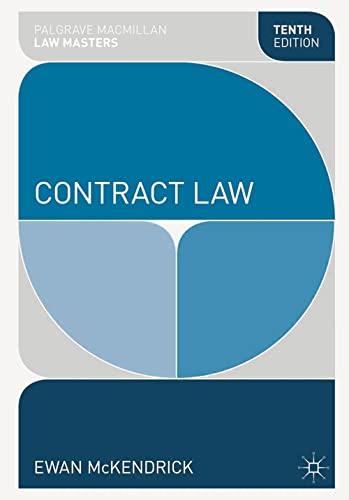Question
Hypothetical Scenario The year is 2031, and a Democrat, Fred Flintstone is now President of the United States. The Republican party has controlled both houses
Hypothetical Scenario
The year is 2031, and a Democrat, Fred Flintstone is now President of the United States. The Republican party has controlled both houses of Congress since 2029 - and the party isn't very happy with the President. It seems that the peace-loving Flintstone refuses to take any war-like action, even when U.S. interests abroad are threatened or even when our allies have requested U.S. help.
After two car bombs exploded outside the U.S. embassy in the country of Bedrock - where aggression against the United States was becoming all too common - Republicans tried to pressure the President to send in troops. When he declined, the House and the Senate decided that enough was enough, and passed a law called the Wage War Act. The President vetoed the law, but Congress overrode his veto. The law created a new congressional committee, the Joint Committee on Waging War (JCWW). Leaders of both parties in both houses of Congress were to serve on the JCWW.
Under the Wage War Act, the JCWW had authority 1) to direct the President to send U.S. troops into foreign nations, 2) to declare war, and 3) to oversee any military action by obtaining confidential documents from the executive branch.
Just a week after Congress passed the Act, the JCWW took advantage of its powers by declaring war on Bedrock, directing President Flintstone to deploy troops there, and issuing a subpoena (an order) to the President and the Secretary of Defense[1] to produce all classified (secret) military and intelligence documents relating to Bedrock. Not only did the President decline, he commanded his Attorney General, Betty Rubble, to launch a constitutional challenge to the law creating the JCWW. Rubble complied, asking a federal district court to invalidate the Wage War Act.
Suppose you were the District Court judge assigned to decide Flintstone v. JCWW. Further suppose that your court has jurisdiction over the case, that the dispute is justiciable, and that the President has standing.
Your job is to address the questions below. In so doing, please base your responses on relevant course materials.
- What are the constitutional arguments for invalidating the Wage War Act?
- What are the constitutional arguments for upholding the Wage War Act?
- Based on your answers to Parts 1 and 2, would you vote to invalidate or uphold the Act? Explain why.
[1] According to the Department of Defense's website, "The Secretary of Defense is the principal defense policy advisor to the President. Under the direction of the President, the Secretary exercises authority, direction, and control over the Department of Defense." The Secretary is appointed by the President subject to confirmation by the Senate.
NOTE: Some of the cases discussed were "Nixon V. United States" and "Youngstown Sheet V. Sawyer"
Step by Step Solution
There are 3 Steps involved in it
Step: 1

Get Instant Access to Expert-Tailored Solutions
See step-by-step solutions with expert insights and AI powered tools for academic success
Step: 2

Step: 3

Ace Your Homework with AI
Get the answers you need in no time with our AI-driven, step-by-step assistance
Get Started


